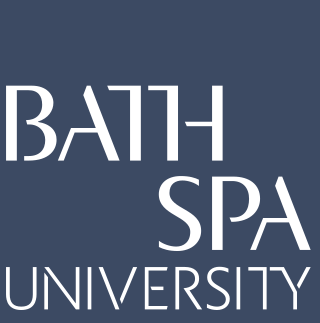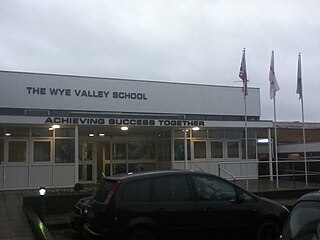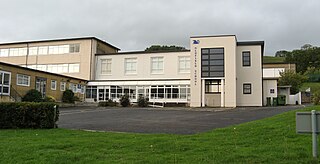Related Research Articles

Bath is a city in the Bath and North East Somerset unitary area in the county of Somerset, England, known for and named after its Roman-built baths. At the 2021 Census, the population was 101,557. Bath is in the valley of the River Avon, 97 miles (156 km) west of London and 11 miles (18 km) southeast of Bristol. The city became a World Heritage Site in 1987, and was later added to the transnational World Heritage Site known as the "Great Spa Towns of Europe" in 2021. Bath is also the largest city and settlement in Somerset.

Somerset is a county in South West England which borders Gloucestershire and Bristol to the north, Wiltshire to the east, Dorset to the south-east and Devon to the south-west. It is bounded to the north and west by the Severn Estuary and the Bristol Channel, its coastline facing southeastern Wales. Its traditional border with Gloucestershire is the River Avon. Somerset is currently formed of six council areas, of which two are unitary authorities, until the four second-tier district councils are merged on 1 April 2023, after which the county will comprise three unitary authorities. Its county town is Taunton.

Bath and North East Somerset (B&NES) is a unitary authority district in England. Bath and North East Somerset Council was created on 1 April 1996 following the abolition of the county of Avon. It is part of the ceremonial county of Somerset.

Keynsham is a town and civil parish located between Bristol and Bath in Somerset, England. It has a population of 19,000. It was listed in the Domesday Book as Cainesham, which is believed to mean the home of Saint Keyne.

Bath Spa University is a public university in Bath, England, with its main campus at Newton Park, about 3+1⁄2 miles (5.6 km) west of the centre of the city. The university has other campuses in the city of Bath, and one at Corsham Court in Wiltshire.
The Kings of Wessex Academy, formerly known as The Kings of Wessex School, is a coeducational secondary school located in Cheddar, Somerset, England. As of 2015, it had 1,176 students aged 13 to 18, of all genders and all ability levels including 333 in the sixth form. In November 2016, the academy became part of the Wessex Learning Trust which incorporated eight academies from the surrounding area. Kings is a Church of England school.

Beechen Cliff School is a boys' secondary school in Bath, Somerset, England, with about 1,150 pupils. Its earliest predecessor school was founded in 1896.

Ralph Allen School in Combe Down, Bath, England, is a co-educational, comprehensive secondary school with academy status. Located on the south-eastern edge of Bath, the school educates 11 to 18-year-olds from Bath and the surrounding area.

Bourne End Academy, is a co-educational secondary school in Bourne End, Buckinghamshire, England. It is a secondary school, which takes pupils from the age of 11 to 18. The school is a smaller than an average secondary school, with just around 800 pupils attending every year.

Hayesfield Girls' School is an all-girls secondary school with a co-educational sixth form located in Bath, England. In August 2011, the school became an academy. The school operates from two main sites, about a seven-minute walk apart. The campus at Brougham Hayes accommodates STEM subjects such as Science, Technology and Maths, and the Upper Oldfield Park campus hosts the Performing Arts, English and Sports faculties.

Oldfield School is a secondary school, with a small sixth form, in Newbridge, Bath, England. Since February 2011, the school has had academy status, meaning that it operates outside the control of the local authority. Prior to 2012 the main school was for girls only, with a co-educational sixth form. In 2017, the school had 1036 students aged 11 to 18.

Bath Community Academy (2012–2018), formerly Culverhay School (1956–2012), was a secondary school in the Odd Down area of Bath, England. Built as a boys' school, it became mixed-sex in 2012.

Wellsway School is a mixed comprehensive school on the eastern side of Keynsham, Somerset, England, for students aged 11 to 18. In November 2021, there were 1,266 students attending the school, which is run by Futura Learning Partnership and has been an academy since October 2011.

Bedford College is a further education college located in Bedford, Bedfordshire, England. It is the principal further education provider in the Borough of Bedford, and is a member of the Collab Group of high performing schools.

Saint Gregory's Catholic College in Odd Down, Bath, England is a Roman Catholic, co-educational secondary school with a sixth form. It was renamed from Saint Gregory's Comprehensive School, which opened in 1979. It teaches around 1000 pupils, its current head teacher is Anne Cusack.

St Mark's is a coeducational Church of England secondary school and sixth form located in Bath, Somerset, England. The school attracts pupils from Bath, Larkhall and Fairfield Park.

Haygrove School is a co-educational secondary school in Bridgwater, Somerset, England, with 1,106 students aged between 11 and 16.
Broadlands Academy is a secondary school in Keynsham, Bath and North East Somerset, England. Formerly known as Broadlands School founded in 1935, the academy opened in December 2012. The school, which had specialist Science College and Engineering College status, has 603 students between the ages of 11 and 16 years, as of 2019.
The City of Bath Technical School in Bath, Somerset, England had various roles from the late 19th century until 1970. It obtained its official name when technical schools were formally introduced in Bath between the years 1892 and 1896, and at first was housed in a new extension of the Guildhall. The school was transformed in the early 20th century, when it was combined with several other institutions, and then evolved through various sites and roles until its closure at Brougham Hayes, Lower Oldfield Park in 1973 after being renamed in 1971 as Culverhay School.

The Taunton Academy is a school with academy status in Taunton, Somerset, England. The school was formed by the merger of The St Augustine of Canterbury Church of England/Roman Catholic VA School and Ladymead Community School. Its original sponsors were Somerset County Council and the Diocese of Bath and Wells, however the school transferred to the Richard Huish Trust in 2015 and is now sponsored by Richard Huish College. It was opened on 9 September 2010 by Peter Price, the Bishop of Bath and Wells. Initially the academy admitted pupils aged 11 to 16 and will be based in the existing schools' buildings. In September 2011, the academy opened a sixth form for 100 students. In 2013, the academy moved to new and refurbished buildings on the former Ladymead site on Cheddon Road, with the former St Augustine site being closed. This plan was temporarily put on hold following the government's major review of the Building Schools for the Future programme in July 2010, and was subject to review by the Department for Education.
References
- ↑ "School Contact Details". Bath and North East Somerset Council. Archived from the original on 24 May 2008. Retrieved 5 July 2008.
- ↑ "History of the University". University of Bath. Archived from the original on 12 November 2007. Retrieved 10 December 2007.
- ↑ "Departments". University of Bath. Retrieved 10 December 2007.
- 1 2 "Bath Spa University". Archived from the original on 9 December 2007. Retrieved 10 December 2007.
- ↑ "Courses at Norland College". Norland College. Archived from the original on 29 July 2010. Retrieved 9 August 2010.
- ↑ "Secondary School Reviews". Bath and North East Somerset Council. Archived from the original on 11 June 2008. Retrieved 23 June 2008.
- ↑ "A Review of Secondary Schools in Bath and North East Somerset". Bath and North East Somerset Council. 27 March 2008. Retrieved 23 June 2008.
- ↑ "A Review of Secondary Schools in Bath". Bath and North East Somerset Council. 14 April 2010. Archived from the original on 21 July 2010. Retrieved 15 July 2010.
- ↑ Claire Miller, Amanda Cameron (15 March 2018). "Bath needs hundreds more school places in just four years' time". Bath Chronicle. Retrieved 24 July 2018.
- ↑ "About BET". Bath Education Trust. Retrieved 20 March 2017.
- ↑ "Secondary schools in Bath and NE Somerset (2009)". BBC. 13 January 2010. Retrieved 19 November 2010.
- ↑ "Secondary schools in Bath and NE Somerset (2010)". BBC. 12 January 2011. Retrieved 17 January 2011.
- 1 2 "GCSE and A-level results: See how B&NES schools performed last summer". Bath Chronicle. 23 January 2014. Archived from the original on 14 July 2014. Retrieved 9 June 2014.
- ↑ "Bath Academy". CIFE. Retrieved 16 November 2015.
- ↑ "Record year for GCSEs". Bath Chronicle. 27 August 2009. Retrieved 19 November 2010.
- ↑ "Primary Schools and Nurseries". Bath and North East Somerset Council. Archived from the original on 24 May 2008. Retrieved 20 September 2008.
- ↑ Ferguson, Sam (11 January 2018). "School support services to be cut as Bath and North East Somerset Council aims to save £16 million by 2020". Bath Chronicle. Retrieved 24 July 2018.
- ↑ Nancy Connolly, Jonathan Coles (5 July 2018). "Bath community gets ready to say goodbye to much-loved school". Bath Chronicle. Retrieved 24 July 2018.
- ↑ Cameron, Amanda (24 July 2018). "Academy trust closing Bath Community Academy justifies high executive pay". Bath Chronicle. Retrieved 24 July 2018.